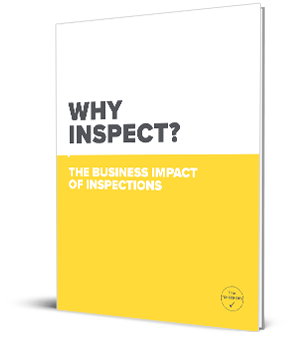We get it; we are an inspection company, so we see the value in inspections. Can you blame us for thinking health, safety, and prevention should be priorities? Unfortunately, not everyone aligns with our values, and we have heard some real doozies over the years when asked why they don’t conduct inspections. So here are 50 of the best (or should we say, worst) excuses.
- We have always done it this way and never had a problem.
- We have never inspected our equipment.
- Maintenance inspects the equipment so we (the operator) don’t have to do an inspection.
- The maintenance service company told us not to inspect the equipment; they do that.
- It takes too much time to inspect the forklift.
- My supervisor said the operator doesn’t perform an inspection because the maintenance staff should be in charge of that.
- The maintenance team checks the cranes once per month so we (the operator) don’t have to inspect them.
- We inspect our forklifts but don’t document them.
- We don’t have an inspection form.
- I am the only one that uses this forklift, so I know what’s going on with it.
- I didn’t know I was supposed to inspect my sales vehicle before driving it. I’m in sales, not in the plant.
- My vehicle is under 4,000 kg so I don’t have to inspect it.
- I don’t have time, and they wouldn’t let me anyways because production starts at 8 am.
- It’s a rental, so I don’t have to inspect it.
- I’m only renting it, so it's not mine to inspect.
- I tell my supervisor when something’s wrong with it.
- They are inspected on the midnight shift when production is not running.
- The equipment is certified annually, so we know it’s in good condition, and we don’t have to inspect it.
- Why should I inspect it when the maintenance workers look after it?
- That’s what maintenance is for.
- The last place I worked at never inspected anything.
- I have been operating for 30 years and never had to inspect it.
- We have never had a problem.
- None of our trucks would be up and running if we inspected them the way you’re saying.
- That’s not an operator’s responsibility.
- The last person inspected it, so I shouldn’t have to do it again.
- The day shift operator is required to inspect it at the beginning of his shift, so we don’t have to do it on the off-shifts.
- If we had a form, what would I do with it?
- Who would I turn inspection forms in to?
- Since when did this become a law?
- I have never heard of this.
- Most people don’t inspect something every time before they use it.
- We keep our pickup trucks clean, so we never get pulled over.
- I talked to the franchisees, and they’re not interested in setting up a formal inspection program for our pickup trucks.
- Nobody ever showed me how to do this.
- I’m only a beginner, so I don’t know much about that.
- We’re just a small company, so we don’t need to worry about that.
- We don’t have any devices to do an electronic inspection.
- We’ve got too many trucks to be inspecting them all every time we use them.
- That would generate too much paperwork for everyone to manage.
- I don’t think that would accomplish anything around here because we only fix things when they break down.
- They don’t fix anything around here. Why should I care if they don’t care about the trucks? It’s not my truck.
- We’ve got all these different types of equipment; you can’t expect us to inspect them all every day, do you?
- No way, I won’t even start down this road of inspecting all of this equipment.
- No inspector ever told us we had to do this.
- When an inspector tells us we have to do this, then I will do something.
- I tried to get them to inspect the equipment regularly, but they don’t turn in the paperwork, or they forget.
- That doesn’t apply to our industry.
- I don’t have time to set up and manage a program like that.
- The mechanic looks after all the equipment, so the guys don’t have to do that, and he does not want anybody else touching them; that’s his job.
We don't want to criticize too much. But we think these excuses aren’t just weak but pretty alarming. We get that regular inspections demand time, money, and effort. But you know what costs even more time, money, and effort? Sudden repairs, expensive replacements, recovery from injury, medical bills, lawyer fees, noncompliance fines, and lawsuits. And don’t even get us started if death is involved in an equipment or vehicle-related accident.
It’s scary how easily most people pass on the responsibility and accountability to maintain safety to others. Yes, it may not be your vehicle, but you’re the one operating it. The consequences of not inspecting it will impact you directly and personally. You can pass the blame to others, such as the maintenance crew or the cleaning staff, but you will also live with knowing you could have and should have done more. The financial costs may not fall directly on you. But if your employer loses too much money paying for the consequences or their business license, then you’re affected too.
If you happen to find something wrong with the vehicle or equipment you’re about to drive or operate, would you go ahead and take it out anyway – potentially putting your life and others’ lives at risk? Inspections don’t mean you have to fix the problems yourself. After all, that’s what the maintenance team and mechanics do. When you conduct an inspection, you identify the issues so that they can be addressed before they cause bigger problems.
Inspections don't need to be hard. Get started with books or software, and don't make excuses any longer.











